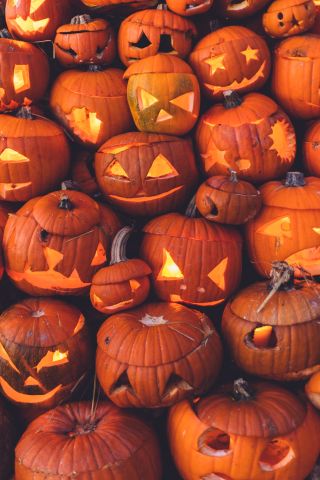SPIRITUALITY- Halloween: How to "Hallow" Every Day. The importance of recognizing the sacred things in life.

KEY POINTS-
- To hallow means to recognize the sacred value of something or someone.
- "Hallowing" is a practice that can adds depth and meaning to your life.
- Spending time outside, reading poetry, and practicing gratitude can help you "hallow."
There’s Halloween, and then there’s hallow-ing.
About the former, one of my friends says Halloween is his favorite holiday. It’s the only night of the year, he says, when you can knock on the door of a total stranger, ask them for candy, and they’ll hand it over gladly, no questions asked.
I loved Halloween when our kids were young. We live in the woods at the back of a cove in the mountains. There were 10 or so kids in the neighborwood then. We’d meet up for a simple meal, then pile the princesses, pirates, and pop stars in the back of pick-up trucks, ride around to each other’s houses, and load everyone up with three months’ worth of sugar.

The favorite stop each year was at Ruth and Nancy’s, a couple in their 80s who’d met in the American Red Cross after World War II. They were assigned to be roommates in Okinawa—where they cared for soldiers before they shipped back to the U.S.—and they remained roommates the rest of their lives. When they came home from Japan, they got jobs teaching at the local high school and lived in a tent while they built a house. They built it themselves, with help from Ruth’s extended family. They dug the foundation with shovels, and their hands were on every inch of that place. Eventually they also built cabins in the woods around the house, and in the summers, they ran a camp for girls. At Halloween, they’d fill the yard with gravestones, hide behind trees, wait for us to pull up, then sneak out dressed as witches. It was scary every year.
Halloween has roots in an ancient Celtic tradition called Samhain (pronounced SAH-win). Samhain happens halfway between the end of the harvest and the beginning of winter, when people believed the veil between the visible and invisible world was especially thin. They believed spirits would cross over and visit, and they built bonfires and dressed in costumes to protect themselves from spirits who might mean them harm.
Hallow-ing
And now the latter: hallow-ing. To hallow means to recognize something as sacred or to imbue it with sacredness, and it’s a fair question to ask which is primary, the recognizing or the imbuing. That is, are there days or moments when the veil between worlds actually grows thinner or the divine heart beats stronger, and ours is the work of noticing? Or are there things we do, habits or practices we exercise, that infuse a quality of sacredness into moments that would otherwise be unremarkable and ordinary?
Who’s to say for sure? But the question reminds me of an essay William James wrote in 1884, called “The Dilemma of Determinism.” In it, he asks whether all events, including the events of human lives, our lives, are determined by prior causes and unalterable, or whether humans actually have at least some element of free will and agency. He concludes that, while it’s impossible to answer that question definitively, human beings are more likely to have a happy life if they assume they have agency.
I know I experience the sacred flame burning brighter and warmer in some moments than in others, and I do not know if that’s because its intensity has somehow increased or because I am somehow more awake or receptive to it. But since either could be true, I’ll follow William James and do what I can to be awake and contribute what I can to the hallowing.
If you’re interested in the same, if you’re interested in more hallow in your life, here are a few ideas that might help.
- Go outside as often as you can. That’s where I am right now. The air is slightly cool, the sun is warming my back, there’s a curtain of trees, red, gold, and bronze, in front of me, and there are a couple of crows conversing. I’m not saying there’s nothing hallow indoors. But I think there’s more of it outdoors.
- Read poetry and memorize some. While I’m outside looking at these trees, the opening line from a Mary Oliver poem (“In Blackwater Woods”) floats into my mind. “Look, the trees are turning their own bodies into pillars of light.” Those words add something to this moment. Poets see things, hear things, feel things, and know things that I am wont to miss, and trees are more amazing, life is more sacred, with a few of them wandering the world with me.
- Go to church, or to synagogue, mosque, sangha, or some other spiritual gathering. Put yourself in proximity to religious ritual and symbol that orient you to the Main Mystery and to a world where what matters is not how much you achieve, how much you acquire, or how much you’re admired, but how much your heart trembles and opens, how much you laugh, how much you cry, how much you love.
- Say yes to children. One of my clients says that when her kids were young and she was in the middle of cooking dinner or doing something else that felt important or urgent, and one of them would ask her to stop and play, she’d tell them no and stay on task. Now she’s a grandmother, and when her grandson asks her to stop and play, she says yes. She still has a high-stress job and as much to do as ever. She just knows better now.
- Slow down. Literally, walk slower, talk slower, breathe slower. Most of us move too fast and do too much, and some of that can’t be helped. But the world is a deeper and more delightful place, or at least more bearable, when we're not traveling at break-neck speed and skimming over the surface. I talk with clients about paying attention to their internal speedometer and, whenever possible, cutting their speed by 10 miles per hour. It’s incredible what a difference this practice makes—how much more relaxed people feel, how much more they notice. It’s also incredible how automatically we rev back up to top speed when we lose consciousness of our internal speedometer.
- Say thank you. Thank you to the people who do things to make your life better, those who do it with a smile and those who do it icy cold. Thank you to animals, domesticated and undomesticated, who keep you company, offer amusement (I mean, really, squirrels are ridiculous), and make the world more interesting and amazing. Thank you to the plants around you, the trees providing your oxygen, the bushes and vines providing your food, the grasses and flowers that color the world and keep the dirt from blowing away. Thank you to your body. It’s doing a gazillion things right this moment that are mind-blowingly amazing—like turning the last meal you ate into nourishment, distributing glucose and oxygen in just the right amounts to the different places it’s needed most, and translating the black markings on this screen into ideas that make sense to you—and you could not do any of this yourself if you took lessons for a hundred years. Thank you to God or whatever you call the unseen lifeforce from which all these wonders flow.
I could go on. But you get the picture. And this day is too pretty to sit here any longer with a computer in my lap.
Happy Hallowing!
- Questions and Answers
- Opinion
- Story/Motivational/Inspiring
- Technology
- Art
- Causes
- Crafts
- Dance
- Drinks
- Film/Movie
- Fitness
- Food
- Jeux
- Gardening
- Health
- Domicile
- Literature
- Music
- Networking
- Autre
- Party
- Religion
- Shopping
- Sports
- Theater
- Wellness
- News
- Culture
- War machines and policy

